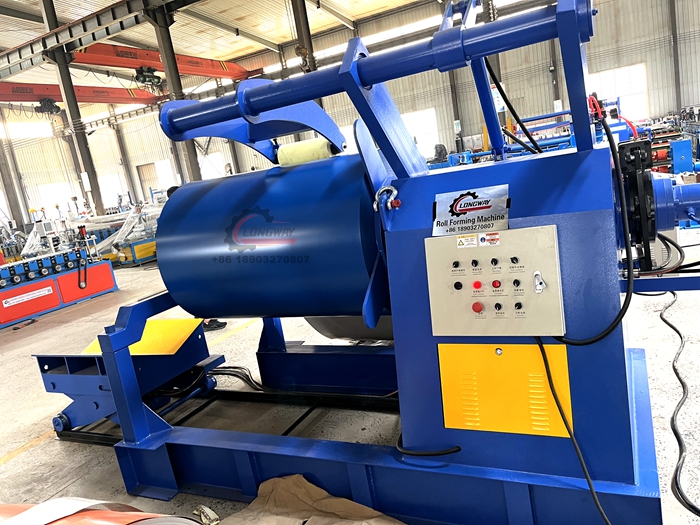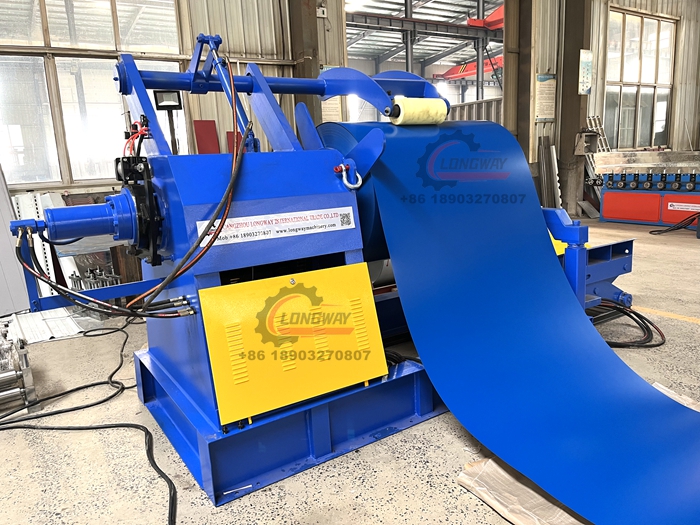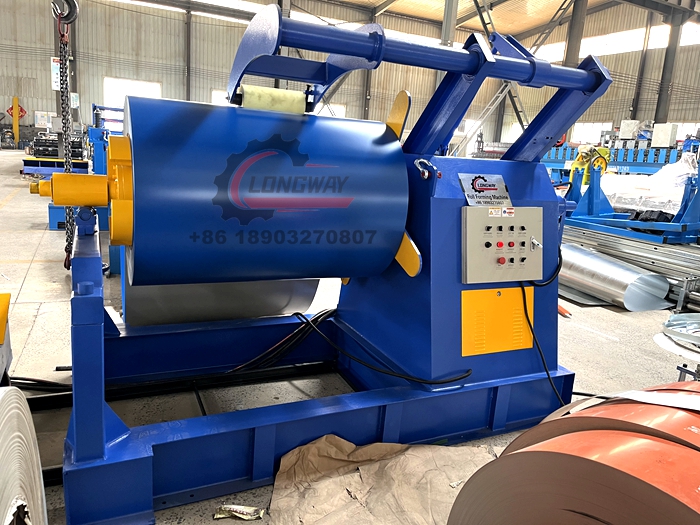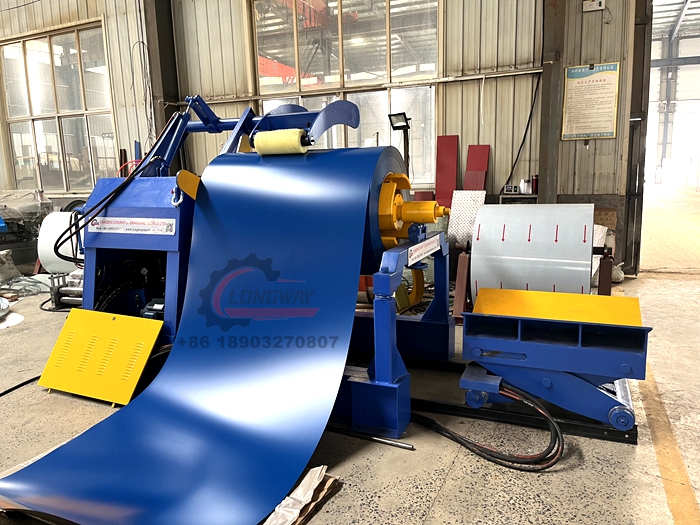Hydraulic Decoiler with Loading Car & Automatic Uncoiler for Efficiency
The Advanced Solution: Understanding Hydraulic Decoiler With Loading Car Automatic Uncoiler
In the demanding landscape of modern manufacturing, efficiency, precision, and safety are paramount. The ability to seamlessly and safely handle heavy coil materials is a critical bottleneck in many production lines. This is where the advanced Hydraulic Decoiler With Loading Car Automatic Uncoiler emerges as a game-changer. Designed to streamline the uncoiling process, this integrated system significantly enhances operational speed, reduces manual labor, and mitigates safety risks associated with traditional coil handling methods. It represents a vital investment for industries requiring consistent, high-volume material feeding, from metal stamping to roll forming and beyond, ensuring a continuous and uninterrupted supply of raw materials to the production line.
This sophisticated machinery integrates the powerful unwinding capabilities of a hydraulic decoiler with the automated, safe loading function of a loading car and the precision of an automatic uncoiler. Such a synergistic design addresses the complexities of managing heavy coils, often weighing several tons, by providing automated transport, accurate centering, and controlled pay-off. The result is a substantial boost in productivity, minimized material waste, and an elevated standard of workplace safety. Our exploration delves into the technical intricacies, application benefits, and strategic advantages that make this system indispensable for optimizing material flow in heavy-duty industrial settings.
Industry Trends and Technological Evolution in Coil Handling
The global manufacturing sector is undergoing a profound transformation, driven by demands for higher output, greater automation, and enhanced safety. Within this context, the coil handling industry is witnessing significant advancements. Trends indicate a clear shift towards fully automated systems that reduce human intervention, increase processing speed, and improve material utilization. Innovations in sensor technology, smart controls, and robust hydraulic systems are pushing the boundaries of what's possible, moving beyond traditional manual or semi-automatic decoiling solutions. The market is increasingly demanding integrated units that offer a complete solution from coil storage to controlled feeding, minimizing setup times and maximizing throughput.
Furthermore, there's a growing emphasis on energy efficiency and sustainable operations. Manufacturers are keen on adopting machinery that not only performs optimally but also consumes less energy and reduces operational costs in the long run. The evolution of the Hydraulic Decoiler With Loading Car Automatic Uncoiler directly reflects these trends, incorporating features like variable frequency drives (VFDs) for precise speed control, regenerative braking systems, and advanced diagnostic capabilities. These technological leaps ensure that modern uncoiling solutions are not just powerful but also intelligent, adapting to diverse material specifications and production demands while adhering to stringent environmental standards.

The integration of Industrial Internet of Things (IIoT) capabilities is also beginning to revolutionize coil handling. Predictive maintenance, remote monitoring, and data analytics capabilities are becoming standard expectations, allowing companies to optimize machine performance, anticipate potential failures, and schedule maintenance proactively. This digital transformation supports a more agile and responsive manufacturing environment, where equipment like the Hydraulic Decoiler With Loading Car Automatic Uncoiler can communicate with other machines on the production line, forming a cohesive and highly efficient ecosystem. This commitment to continuous innovation ensures that the machinery remains at the forefront of industrial efficiency and safety.
Detailed Manufacturing Process and Quality Assurance
The production of a high-performance Hydraulic Decoiler With Loading Car Automatic Uncoiler involves a multi-stage, precision-engineered manufacturing process that adheres to stringent quality control standards. The journey begins with the selection of premium-grade materials, primarily high-strength structural steel for the frame and critical load-bearing components, and specialized alloys for shafts and hydraulic cylinders. These materials are chosen for their superior tensile strength, fatigue resistance, and durability, ensuring the machine's longevity and reliable operation under heavy industrial loads. Key components such as mandrels and gears often utilize hardened tool steel or chrome-plated surfaces to withstand wear and corrosion.
The manufacturing process typically includes several advanced techniques. Large structural elements undergo precise CNC (Computer Numerical Control) cutting and welding, followed by stress relieving to prevent material deformation. Critical rotational parts, such as the main spindle and gear shafts, are often forged for improved grain structure and strength, then subjected to meticulous CNC machining to achieve micron-level tolerances. Hydraulic cylinders and pumps, the heart of the system, are manufactured using specialized casting or forging processes, followed by precision grinding and honing to ensure smooth, leak-free operation and optimal pressure retention. Each stage is subject to rigorous in-process inspections.

Quality assurance is embedded throughout the entire production lifecycle. Prior to assembly, all components undergo non-destructive testing (NDT) methods, including ultrasonic testing and magnetic particle inspection, to detect any internal flaws. Welds are inspected using radiographic or dye penetrant methods. Post-assembly, the complete Hydraulic Decoiler With Loading Car Automatic Uncoiler undergoes a comprehensive series of functional tests, including full load testing, hydraulic system pressure checks, and electrical system diagnostics, to ensure compliance with international standards such as ISO 9001 for quality management and ANSI (American National Standards Institute) standards for machine safety and performance. Typical service life for well-maintained units ranges from 15 to 25 years. These decoilers are indispensable in industries like petrochemical (for pipe manufacturing), metallurgy (for coil slitting and forming lines), and construction (for metal roofing and cladding production), where their robust design offers superior resistance to corrosion and ensures energy-efficient operation due to optimized hydraulic systems and precision controls.
Technical Parameters and Specifications
Understanding the technical specifications of a Hydraulic Decoiler With Loading Car Automatic Uncoiler is crucial for matching the equipment to specific operational requirements. These machines are designed with a range of capacities and features to accommodate various material types, thicknesses, and coil weights. Below is a representative table of key technical parameters that define the performance and capabilities of a typical advanced hydraulic decoiler system. These parameters are critical for assessing the machine's suitability for high-volume, precision metal processing lines.
| Parameter | Typical Range / Value | Description / Importance |
|---|---|---|
| Coil Weight Capacity | 5-30 Tons (e.g., 10,000kg to 30,000kg) | Defines the maximum weight of the coil the machine can safely handle. Critical for heavy gauge metal industries. |
| Coil Inner Diameter (I.D.) | Ø480-Ø760 mm (adjustable) | The range of inner diameters of coils that can be mounted. Adjustable mandrels provide flexibility. |
| Coil Outer Diameter (O.D.) | Max Ø1800-Ø2200 mm | The maximum outer diameter of the coil. Impacts the total material capacity and run time. |
| Coil Width | Max 1600 mm - 2000 mm | Maximum width of the material coil that can be processed. |
| Material Thickness Range | 0.4 mm - 6.0 mm (varies by model) | The range of material gauges the decoiler can handle effectively. |
| Decoiling Speed | 0-25 m/min (variable speed drive) | Adjustable speed for controlled unwinding, often controlled by an ultrasonic sensor or loop control. |
| Hydraulic Pressure | Max 16 MPa (160 Bar) | Operating pressure of the hydraulic system, indicating power for expansion and clamping. |
| Motor Power | 7.5 kW - 22 kW | Power rating of the main drive motor. Higher power for heavier coils and faster speeds. |
| Loading Car Weight Capacity | Matches Decoiler Capacity (e.g., 10-30 Tons) | Ensures the loading car can safely transport coils to the decoiler. |
| Control System | PLC (Siemens, Mitsubishi, Delta) with HMI Touchscreen | Advanced programmable logic controllers for automated operation, diagnostics, and user interface. |
These specifications allow for precise customization and selection, ensuring the Hydraulic Decoiler With Loading Car Automatic Uncoiler integrates perfectly into existing or planned production lines. The adjustable nature of parameters like inner diameter and decoiling speed highlights the versatility of these systems, accommodating a wide range of materials from galvanized steel to aluminum and stainless steel, commonly used in various industrial applications.
Application Scenarios and Exemplary Case Studies
The versatility and robust design of the Hydraulic Decoiler With Loading Car Automatic Uncoiler make it an indispensable asset across a multitude of heavy industrial applications where coil material handling is fundamental. Its primary role is to efficiently feed coiled raw materials into subsequent processing machinery, such as roll forming lines, slitting lines, stamping presses, and cut-to-length lines. This seamless integration ensures continuous production, minimizes downtime, and significantly improves overall operational efficiency.
- Automotive Industry: Used in stamping lines for producing vehicle body parts, chassis components, and structural elements from high-strength steel coils. The automatic loading car ensures rapid coil changes, crucial for high-volume production.
- Construction and Building Materials: Essential for roll forming operations creating metal roofing, wall panels, purlins, and steel frames. The decoiler accurately feeds various gauges of galvanized steel, aluminum, and pre-painted coils.
- HVAC and Ductwork Manufacturing: Facilitates the production of duct components and ventilation systems by feeding sheet metal coils into forming machines. Precision unwinding prevents material deformation.
- Appliance Manufacturing: In lines producing refrigerators, washing machines, and other household appliances, where large volumes of sheet metal are formed and stamped.
- Metal Service Centers: Utilized in slitting and cut-to-length lines to process master coils into narrower strips or custom lengths for various clients, optimizing material inventory and delivery.

Case Study: High-Volume Roll Forming Line
A leading manufacturer of pre-engineered metal buildings invested in a custom Hydraulic Decoiler With Loading Car Automatic Uncoiler to support their high-speed roll forming lines. Previously, manual loading of 15-ton steel coils was a bottleneck, requiring multiple operators and extended downtime for coil changes. After implementing the automated system, coil changeover times were reduced by 70%, from an average of 45 minutes to just 12 minutes. This improvement directly translated to a 15% increase in daily production output and a significant reduction in labor costs associated with material handling. The precise tension control also minimized material waste due to snags or uncontrolled unwinding, contributing to a 5% material efficiency gain. This real-world application underscores the significant operational and financial benefits derived from adopting such advanced machinery.
Key Technical Advantages and Competitive Edge
The distinct advantages offered by a modern Hydraulic Decoiler With Loading Car Automatic Uncoiler extend beyond mere functionality, providing a tangible competitive edge in an increasingly automated industrial landscape. These systems are engineered to address common pain points in coil handling, delivering significant improvements in efficiency, safety, and operational reliability.
- Enhanced Safety: The integrated loading car automates the hazardous process of lifting and positioning heavy coils, significantly reducing the risk of operator injury and equipment damage. This aligns with modern safety protocols and reduces workers' compensation claims.
- Increased Productivity: Automatic coil loading and precise unwinding minimize downtime between coil changes and ensure a consistent material feed rate. This leads to higher throughput, optimized machine utilization, and ultimately, greater production capacity.
- Precision and Control: Hydraulic expansion and braking systems provide superior tension control, preventing material kinks, scratches, or uncontrolled pay-off. This precision is vital for maintaining material quality, especially for delicate or high-finish materials, and contributes to reduced scrap rates.
- Reduced Labor Costs: Automation of coil handling tasks frees up personnel for other, more skilled responsibilities, leading to a more efficient allocation of human resources and long-term cost savings.
- Versatility: Adjustable mandrel designs and variable speed drives allow the system to handle a wide range of coil weights, inner diameters, and material types, offering flexibility for diverse production requirements.
- Durability and Longevity: Constructed from heavy-duty materials and precision-engineered components, these machines are built to withstand continuous, rigorous operation in harsh industrial environments, ensuring a long operational lifespan and high ROI.
These technical advantages cumulatively contribute to a lower total cost of ownership (TCO) and a faster return on investment (ROI) for businesses that prioritize efficiency, safety, and consistent quality in their manufacturing processes. The robust construction ensures a lower maintenance burden, while the automation features reduce operational variances.
Manufacturer Comparison and Selection Criteria
Selecting the right supplier for a Hydraulic Decoiler With Loading Car Automatic Uncoiler is a critical decision that impacts long-term operational success. While many manufacturers offer such equipment, their capabilities, quality, and after-sales support can vary significantly. Discerning buyers should evaluate vendors based on several key criteria to ensure an optimal investment.
| Criterion | High-Quality Manufacturer (e.g., LW Roll Forming Machine) | Standard Manufacturer |
|---|---|---|
| Material Quality & Craftsmanship | Utilizes high-grade structural steel (Q345B/C), precision machined components (e.g., CNC, hardened gears), advanced welding. Compliance with ISO 9001. | Standard steel, less precise manufacturing, potential for weaker welds. Basic quality checks. |
| Hydraulic & Electrical Components | Employs renowned global brands (e.g., Siemens PLC, Rexroth/Vickers hydraulics, Schneider electricals). Excellent reliability and global service. | Local or lesser-known brands, potentially lower quality, limited spare parts availability. |
| Automation & Control System | Advanced PLC with user-friendly HMI, remote diagnostics, integration capabilities with existing ERP/MES. Smart sensors for optimized loop control. | Basic push-button controls, limited automation features, minimal diagnostic feedback. |
| Customization & Engineering Support | Strong R&D team capable of bespoke solutions for unique coil sizes, materials, or line integration. Detailed engineering proposals. | Limited customization options, primarily standard models. Less technical support for integration challenges. |
| After-Sales Service & Warranty | Comprehensive warranty (e.g., 2-5 years), global technical support, rapid spare parts supply, on-site installation & training. | Shorter warranty, limited or slow technical support, potential difficulties with spare parts. |
| Industry Track Record & Certifications | Years of experience, proven client base, positive testimonials, certifications (CE, ISO, SGS). | Newer or less established, fewer verifiable references, potentially lacking key industry certifications. |

Choosing a manufacturer with a robust track record and commitment to quality, like LW Roll Forming Machine, ensures not only a superior Hydraulic Decoiler With Loading Car Automatic Uncoiler but also reliable partnership and support throughout the machine's lifecycle. Verifying compliance with industry standards such as CE (for European markets) and a clear, transparent warranty commitment are paramount for mitigating risks and securing a valuable asset for your operations.
Customization and Integrated Solutions
While standard models of the Hydraulic Decoiler With Loading Car Automatic Uncoiler meet a wide range of industrial needs, many advanced manufacturing operations require tailored solutions to perfectly integrate with existing production lines or handle highly specific material requirements. Customization goes beyond basic parameter adjustments, encompassing design modifications, specialized features, and complete line integration. This approach ensures maximum efficiency and compatibility, eliminating potential bottlenecks and optimizing overall material flow.
Examples of customization options include:
- Increased Capacity: For extremely heavy coils (e.g., up to 40 tons) or extra-wide materials beyond standard limits.
- Special Material Handling: Modifications for delicate surfaces (e.g., polished stainless steel) with non-marring contact points, or for highly abrasive materials requiring specialized roller coatings.
- Advanced Automation & Sensing: Integration with laser sensors for ultra-precise loop control, automatic coil end detection, or barcode scanning for inventory management.
- Environmental Adaptations: Enhanced protection for dusty, humid, or corrosive environments, including specialized coatings or sealed components.
- Interfacing with Existing Systems: Seamless communication protocols (e.g., Profibus, Ethernet/IP) to integrate with plant-wide ERP (Enterprise Resource Planning) or MES (Manufacturing Execution System) systems for data exchange and predictive maintenance.
- Space Constraints: Compact designs or specific configurations to fit within limited factory footprints.
A reputable manufacturer provides comprehensive engineering consultation, working closely with clients to assess their unique requirements and design a bespoke solution that optimizes performance and ensures long-term operational excellence. This collaborative approach from initial design to final commissioning is crucial for achieving peak efficiency in complex industrial setups.
Frequently Asked Questions (FAQs)
Q1: What are the primary safety features of a Hydraulic Decoiler With Loading Car Automatic Uncoiler?
A1: Modern Hydraulic Decoiler With Loading Car Automatic Uncoiler units are equipped with multiple safety features. These include emergency stop buttons strategically placed around the machine, safety guarding to prevent access to moving parts, overload protection for both the decoiler and loading car, hydraulic pressure relief valves, and automatic braking systems to prevent uncontrolled unwinding. The loading car's automated movement minimizes human interaction with heavy coils, significantly reducing the risk of pinch points and crushing hazards.
Q2: How does the automatic uncoiler ensure precise material feeding?
A2: Precision in material feeding is achieved through a combination of hydraulic expansion and braking, often coupled with advanced loop control systems. A non-contact sensor (e.g., ultrasonic or photoelectric) monitors the material loop between the decoiler and the next machine. The PLC (Programmable Logic Controller) then dynamically adjusts the decoiling speed and braking force to maintain a consistent loop, ensuring smooth, tension-free feeding and preventing material surges or breaks. This precision is critical for subsequent high-speed processing.
Q3: What is the typical installation and commissioning process like?
A3: Installation typically involves preparing a reinforced concrete foundation to support the machine's weight and dynamic forces. The manufacturer usually provides detailed foundation drawings. Once the machine is delivered, skilled technicians from the supplier perform the assembly, alignment, electrical connections, and hydraulic system setup. Commissioning includes rigorous testing under various load conditions, calibration, and training for your operational and maintenance staff. The entire process can take from a few days to a couple of weeks, depending on the complexity of the system and integration requirements.
Q4: What kind of maintenance does a Hydraulic Decoiler With Loading Car Automatic Uncoiler require?
A4: Regular maintenance is essential for longevity and optimal performance. This includes daily visual checks, weekly lubrication of moving parts (bearings, gears), regular inspection of hydraulic fluid levels and condition, checking for leaks, and ensuring all electrical connections are secure. Periodically, hydraulic filters need replacement, and the entire hydraulic system should be flushed. Calibration of sensors and verification of safety interlocks should also be part of a scheduled preventive maintenance program, typically every 3-6 months, depending on usage intensity.
Delivery, Warranty, and Customer Support
A key differentiator for a reliable supplier of Hydraulic Decoiler With Loading Car Automatic Uncoiler is their commitment to transparent delivery processes, comprehensive warranty coverage, and responsive after-sales support.
- Delivery Cycle: The typical manufacturing and delivery lead time for a standard unit ranges from 60 to 90 working days from order confirmation, depending on customization levels and current production schedules. Complex or highly customized systems may require a longer lead time, up to 120 days. Reputable manufacturers provide clear project timelines and regular progress updates.
- Quality Assurance & Testing: Before shipment, every Hydraulic Decoiler With Loading Car Automatic Uncoiler undergoes a rigorous factory acceptance test (FAT), where performance parameters are verified against design specifications. Clients are often invited to witness this testing.
- Warranty Commitment: A standard warranty for structural components and major mechanical parts typically ranges from 12 to 24 months, with 6 to 12 months for electrical and hydraulic components. Premium manufacturers may offer extended warranties, up to 5 years on structural elements, reflecting confidence in their build quality. This warranty covers defects in material and workmanship under normal operating conditions.
- Customer Support & Spare Parts: Post-purchase support is crucial. This includes readily available technical assistance (via phone, email, or video call), a comprehensive inventory of spare parts for rapid dispatch, and the option for on-site technical service for installation, troubleshooting, and routine maintenance. Many leading suppliers also offer remote diagnostic capabilities to resolve issues quickly without dispatching personnel.
These assurances provide peace of mind and protect your investment, ensuring minimal disruption to your operations and maximum uptime for your critical production machinery.
Conclusion: The Future of Coil Handling
The Hydraulic Decoiler With Loading Car Automatic Uncoiler stands as a testament to the continuous evolution of industrial automation and material handling technology. Its integrated design and advanced features address the complex challenges of managing heavy coil materials, delivering unparalleled levels of safety, efficiency, and precision to diverse manufacturing sectors. From significantly reducing manual labor and mitigating workplace hazards to enhancing production throughput and ensuring consistent material quality, this system provides a robust foundation for modern, high-performance production lines.
Investing in such sophisticated machinery is not merely an expenditure but a strategic decision that drives long-term profitability, operational excellence, and a competitive edge in a rapidly advancing global market. As industries continue to embrace automation and digital integration, the role of intelligent coil handling solutions will only grow in importance, solidifying the position of the hydraulic decoiler with loading car automatic uncoiler as an indispensable component in the factory of the future.
References
- "Advanced Manufacturing Processes." Academic Press.
- "Handbook of Metal Forming." Society of Manufacturing Engineers.
- "Safety Standards for Industrial Machinery and Equipment." ISO (International Organization for Standardization).
- "Hydraulic Systems and Equipment Design." McGraw-Hill Professional.
- "Smart Manufacturing and Industry 4.0." Springer Publishing.
-
Corrugated iron roofing sheet making machine with CE, AutoNewsNov.17, 2025
-
3mm Steel C U Channel Roll Forming Machine, Heavy DutyNewsNov.17, 2025
-
Calamima Micro Ondulada corrugated roof sheet machine - CNCNewsNov.17, 2025
-
Metal Roofing Roll Former for Sale Companies - Fast, PreciseNewsNov.17, 2025
-
Drywall Steel L Angle Bar forming machine | Fast, PreciseNewsNov.17, 2025
-
Corrugated Iron Roofing Sheet Making Machine, Fast & DurableNewsNov.11, 2025
-
Corrugated Metal Roofing Machine | High-Speed, Precise, CENewsNov.11, 2025







